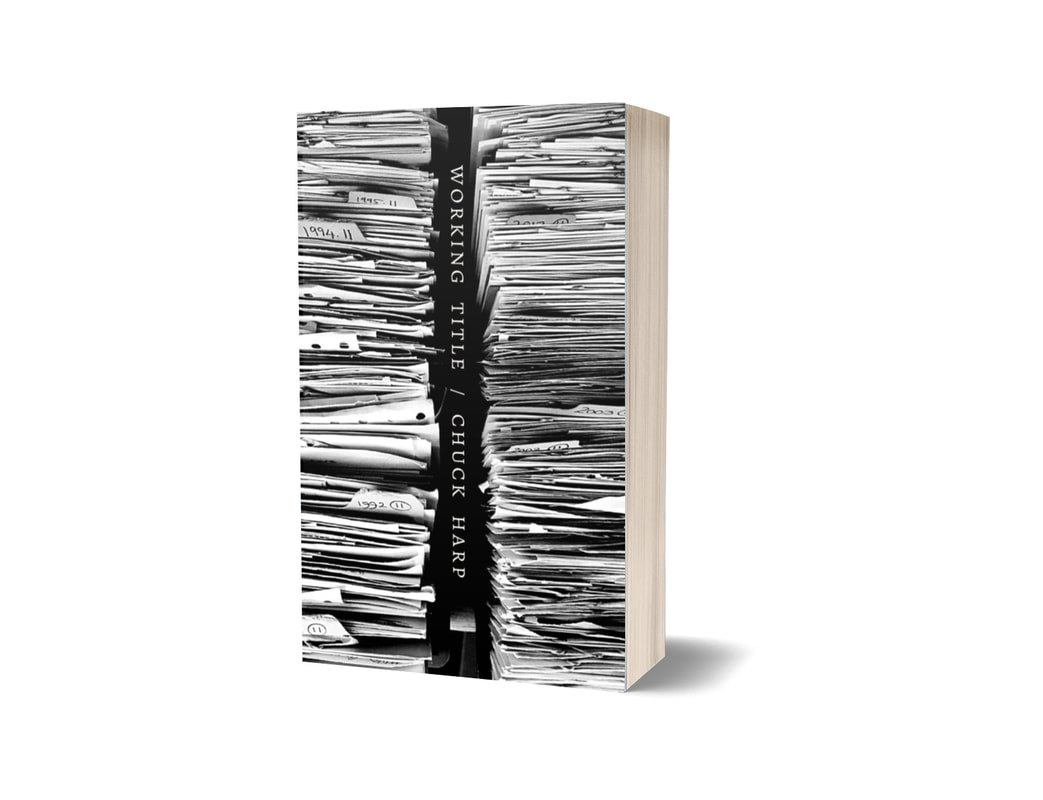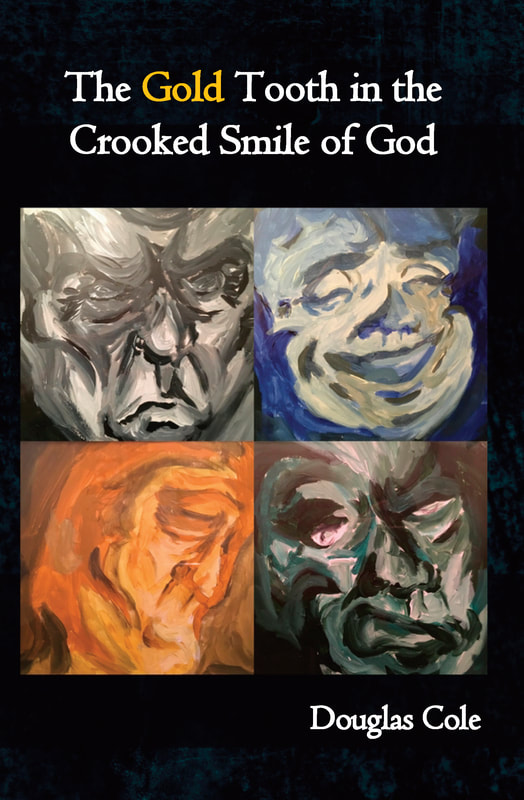Unsolicited Press
 Available November 10, 2020 Available November 10, 2020 Working Title by Chuck Harp presents a confluence of the integrity and denigration of human spirit in the digital-industrial modernity we reside. Under a less nuanced poet this material would come across as didactic, but what Harp does so well is turn the reading into a rhythmic flow that feels like you are looking through the eyes of a camera on a track which is spinning to focus on different people as it rolls. The layman, the unknown artist with their own rich history and voice, is celebrated from the start with “The Cheap Seats”, a title reverberant with the influence of Neil Gaiman’s “The View from the Cheap Seats”. It is here that we find the handshake of the reader and the author, unapologetic and outward with influence for this reader I immediately found a home in Harp’s work because of this. Yet, despite the similar titles, the poem racks us fast into the ironic world we reside in which billions of people with hardly any money pay full price to see a film like Avengers Endgame while Disney makes off with even more fuel monetarily and in the minds and hearts of the poor masses cheering on as Captain America proves he is worthy to wield the Hammer of a Norse God. The frustration and anger at this irony is palpable, but not anywhere close to off putting, if commiseration is the focus of many of the early poems in the book then vulnerable humility is the undercurrent that takes mainstage after the initial venting has passed. “The Hunt” takes us into the uncomfortable space of recognizing how fragile the support of monetary future is in a world where jobs are unreliable long term, or even worse, time and energy consuming for the artist. “Skills” the anxious negotiation between the self we perceive vs. the self we present to be hirable or publishable, and not only the mental strain that puts on a person, but the dilemma of living as an autonomous artist when you may have to change your work for it to be shared, and to possibly have a future continuing to share it. The poems continue their journey through the dregs of the working class and the time and life they lose in their survivalist state. The push and pull between the responsibility to strike and the pressure that puts on one’s ability to live, the corporate assholes who need cheap labor’s practices, and how the idea of money plays with one’s self-worth are also on the spit. Where the journey soars though is not in the misery of these experiences, but in the beautiful spaces that are found and the suffering endured to survive being able to return to it. The poem “Overtime” takes this into account and breathes so much living air into what we as readers have not only endured in the process of going on Harp’s journey, but what many of us have gone through in living in America. Even something as small as staying up an extra half hour when already exhausted just to kiss your partner goodnight is deep balm for all that is churned and torn. Especially if you are an artist of any medium who is reinforced with the need to constantly compare their accomplishments to the quality of their character in society. This utilitarianism is actively critiqued multiple times over by way of the emotional accounts present. The accumulative poem aptly titled “Working Title” is button on the journey. It is heart breaking, heart affirming, exhausting, and something that should be stood by in solidarity. Chuck Harp knows not only his poetic voice, but how to allow confluence between each poem. The synthesis makes the read digestible, while also being incredibly complex. I hope to see more work and poems from him in the future, and for more publishers to give him the attention and time he is due. The poems in this generous collection mirror the chosen title. One after another they engage our not-so-secret foibles, desires, rants & ravages. & they leap around, which keeps us slightly off-balance but engaged & curious, what will the poet come up with next? Douglas Cole’s latest collection of poems titled The Gold Tooth in the Crooked Smile of God is a challenge from beginning to end, where the outcome varies, as it does in all good poetry, according to what the reader brings to it or fashions from it while reading. Cole is unusually adept at leaving enough unsaid to require the reader to enter what Gaston Bachelard calls a reverie of will, in this case interpreted as “I will puzzle this out.” Zbigniew Herbert once said, “It is vanity to think that one can influence the course of history by writing poetry. It is not the barometer that changes the weather.” And yet the barometer is an essential tool for translating the pressure of the atmosphere to help us forecast what weather is headed our way. In The Gold Tooth in the Crooked Smile of God, Douglas Cole has provided readers with a precise collection of atmospheric readings for the weather systems of human relationships and struggles. The poems in the collection blow and rumble, rage and grow still. After finishing the collection I felt tousled and sunburnt and invigorated. There is much beauty to behold in Douglas Cole’s compulsively readable poetry collection The Gold Tooth in the Crooked Smile of God. As a whole, these poems leave the reader with the feeling of movement in depictions of gritty landscapes and the people whose dreams and failures inhabit them. These places are filled with memorable characters who the poet presents to the reader without judgment, and often with an open-eyed wonder. The reader winds up feeling like a witness and a friend. Douglas Cole is a poet that America needs right now. The country is having a loud argument with itself; so loud, you almost forget that the majority of Americans aren’t shouting at anyone, they’re just trying to get by. Cole writes poetry for this America - for the man who sits down in a reading room out of the rain who “knows someone’s coming / to try and kick him out, / so he lowers his head / and sets up for a siege”, people “watching the world die wishing it weren’t”, and the hanged man who consoles himself with the thought that “I’ll never regret again / I’ll never choose badly again / I’ll never wait in line again”. 
Anne Leigh Parrish's collection By the Wayside released just a week ago and the reviews are really swell. We wanted to share one of our favorites with you, written by Chrissi Sepe on Amazon:
Anne Leigh Parrish's stories hit an emotional nerve which ensures you will remember them. One of my favorite stories in her newest collection, "By The Wayside," is "Where Love Lies." It is about a woman named Dana who moves to a quiet, yet gossipy, island town to escape her former life. Her self-esteem is wrecked, and she wants to start over and rebuild her confidence and heal herself through her love of painting. However, as she befriends an older man and finds herself attracted to another man closer to her age, she realizes that this beautiful island town is everything but serene, and danger lurks because, as she says: "Hating was far easier than loving, and came more naturally." Yet Dana survives, as Parrish's female protagonists seem to do. No matter how difficult situations get for these strong women, they persist and often turn out wiser and more confident and capable than they were when we first met them in their stories. Not only do we as readers discover shocking truths about them, but the characters themselves are often surprised at the capabilities they hold inside and of what they are able to achieve if they just have the courage to speak up or to make changes in their lives. In "How She Was Found," lead character, Fiona, begins the story described as a "mouse." She is compliant and insecure, and these traits are not likely to serve her well when she sets out as the only female on an archaeological dig with her professor and three male fellow graduate students. When she finds the bone of a human hand, she believes her professor will finally take her seriously, as she feels he never listens to her. Where to Buy Anne's Book Hominis does a helluva a job creating vibrant paintings in your brain with nothing but static text, helping explore the vast worlds of love and humanity.
Note: To be fully transparent, Ohan is like a brother to me. I see no point in writing an intentionally nebulous review that aims to obfuscate that fact, and I'll actually be leveraging our collaborative friendship to illuminate the power of this collection. What is poetry? What is love? What does it mean to write the first, and feel the second? While we may never fully grasp these concepts fully, I have full confidence that a conscious read of Ohan Hominis' Scattered Allegories will do exactly what the title suggests: shatter the shackles holding you in that metaphorical cave, allowing you to see at least some sliver of formerly distorted light. This poetry is real and raw, yet crafted with careful intention that brings you through the initial experience and subsequent analysis of a human being capable of sensing and communicating an impressively broad spectrum of thought and emotion. This poetry will make you raise your eyebrows. It'll make you smile, smirk, and laugh. It may make you cry — though perhaps not for reasons you might expect. Some of it will likely turn you on, since certain scenes are reminiscent of depictions on Grecian urns. To quote an unassuming bystander following the performance of one of these poems: "That was sexy." Above all else, though: this poetry will make you feel. If the aim of prose is to communicate concrete ideas while also keeping the ethos engaged, poetry takes the opposite approach, assailing the senses to provide the reader or listener with something concrete — but something that only they could provide to themselves. So while Hominis speaks of his own experiences in exquisite detail, they draw parallels to your own experiences, and allow you to walk away with newly discovered pieces of yourself. As a writer whose aims for poetry are more concrete and didactic, I'm seriously inspired by this collection. While it can be enjoyed by all, it's a reminder to writers in particular that there is no proper way to communicate a message — that the seemingly simple though actually quite difficult task of being true to your own feelings is all you must do to reach other minds. Hominis reminds us that this is in fact the only way to communicate anything concrete. If you're a fan of poetry, there's no question that you'll enjoy this work. It's refreshingly unique and authentic, and represents a legion of artists who recognize that the purpose of creation is to create what is real to the creator. This is, after all, the only way that it can be real to anyone else. If you're not into poetry, then simply forget the word poetry and pick up this collection of verbalized memories and sentiments as a means of opening your own perspective to whatever you've been missing. There is an immense beauty in every walk of life, and works like these — due to their careful exploration of important ideas, while maintaining accessibility — are pivotal in helping us appreciate it.  In the opening and title story of his riveting collection, Timothy O’Leary returns fire, blasting the S.O.B. Cheney with true facts spun out by a fictional victim in a most entertaining way. As with all of the stories, O’Leary’s exuberant, fast-paced style bobs us down rivers of his savvy takes on the cultures, fun, fears, and realities of our time. “One Star” gets into the heads and hearts of a struggling immigrant restaurant family and struggling, married, U.S. born customers disappointed by a declined Groupon. A drunken Yelp-like review exposes a cleavage too often exploited by politicians and leading to consequences both sides regret. A has-been sitcom actor was content with his life of booze and pussy as a travelling stand-up comic until he is blind-sided by an up-and-coming talent using the technology and tools of today in “Hecklers.” A widower who avoided cell phones and blames them for the death of his wife takes another look at his departed wife and the phone’s benefits when the neighbor boy shows him a video of her at her best in “The Tower.” Each story in this collection is a gem of thought, language and craft. Some are funny, some are darkly funny (e.g., “Adolph’s [Hitler] Return”), and others are dramatic. All are superbly entertaining. Together, they process and contextualize the world around us from the perspective of someone who has been paying attention for the past four decades. Personally, I finish about one in every nine books I begin. I finished this one in no time. My biggest criticism is that I wish there were even more than eighteen stories. Tim O'Leary's book "Dick Cheney Shot Me in the Face" is available for preorder and releases on 2/16/2017. |
Popular Topics
All
We Support Indie Bookshops |

